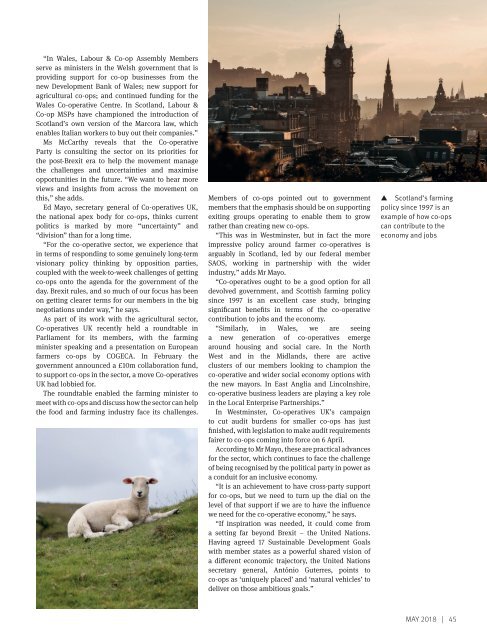MAY 2018
The May 2018 edition of Co-op News: connecting, challenging and championing the global co-operative movement. This issue shines a spotlight on governance – and how co-operatives do it differently. We also look at co-ops on the agenda in Westminster, sustainability supporting and preview some of the motions being put to the vote at the Co-op Group AGM.
The May 2018 edition of Co-op News: connecting, challenging and championing the global co-operative movement. This issue shines a spotlight on governance – and how co-operatives do it differently. We also look at co-ops on the agenda in Westminster, sustainability supporting and preview some of the motions being put to the vote at the Co-op Group AGM.
You also want an ePaper? Increase the reach of your titles
YUMPU automatically turns print PDFs into web optimized ePapers that Google loves.
“In Wales, Labour & Co-op Assembly Members<br />
serve as ministers in the Welsh government that is<br />
providing support for co-op businesses from the<br />
new Development Bank of Wales; new support for<br />
agricultural co-ops; and continued funding for the<br />
Wales Co-operative Centre. In Scotland, Labour &<br />
Co-op MSPs have championed the introduction of<br />
Scotland’s own version of the Marcora law, which<br />
enables Italian workers to buy out their companies.”<br />
Ms McCarthy reveals that the Co-operative<br />
Party is consulting the sector on its priorities for<br />
the post-Brexit era to help the movement manage<br />
the challenges and uncertainties and maximise<br />
opportunities in the future. “We want to hear more<br />
views and insights from across the movement on<br />
this,” she adds.<br />
Ed Mayo, secretary general of Co-operatives UK,<br />
the national apex body for co-ops, thinks current<br />
politics is marked by more “uncertainty” and<br />
“division” than for a long time.<br />
“For the co-operative sector, we experience that<br />
in terms of responding to some genuinely long-term<br />
visionary policy thinking by opposition parties,<br />
coupled with the week-to-week challenges of getting<br />
co-ops onto the agenda for the government of the<br />
day. Brexit rules, and so much of our focus has been<br />
on getting clearer terms for our members in the big<br />
negotiations under way,” he says.<br />
As part of its work with the agricultural sector,<br />
Co-operatives UK recently held a roundtable in<br />
Parliament for its members, with the farming<br />
minister speaking and a presentation on European<br />
farmers co-ops by COGECA. In February the<br />
government announced a £10m collaboration fund,<br />
to support co-ops in the sector, a move Co-operatives<br />
UK had lobbied for.<br />
The roundtable enabled the farming minister to<br />
meet with co-ops and discuss how the sector can help<br />
the food and farming industry face its challenges.<br />
Members of co-ops pointed out to government<br />
members that the emphasis should be on supporting<br />
exiting groups operating to enable them to grow<br />
rather than creating new co-ops.<br />
“This was in Westminster, but in fact the more<br />
impressive policy around farmer co-operatives is<br />
arguably in Scotland, led by our federal member<br />
SAOS, working in partnership with the wider<br />
industry,” adds Mr Mayo.<br />
“Co-operatives ought to be a good option for all<br />
devolved government, and Scottish farming policy<br />
since 1997 is an excellent case study, bringing<br />
significant benefits in terms of the co-operative<br />
contribution to jobs and the economy.<br />
“Similarly, in Wales, we are seeing<br />
a new generation of co-operatives emerge<br />
around housing and social care. In the North<br />
West and in the Midlands, there are active<br />
clusters of our members looking to champion the<br />
co-operative and wider social economy options with<br />
the new mayors. In East Anglia and Lincolnshire,<br />
co-operative business leaders are playing a key role<br />
in the Local Enterprise Partnerships.”<br />
In Westminster, Co-operatives UK’s campaign<br />
to cut audit burdens for smaller co-ops has just<br />
finished, with legislation to make audit requirements<br />
fairer to co-ops coming into force on 6 April.<br />
According to Mr Mayo, these are practical advances<br />
for the sector, which continues to face the challenge<br />
of being recognised by the political party in power as<br />
a conduit for an inclusive economy.<br />
“It is an achievement to have cross-party support<br />
for co-ops, but we need to turn up the dial on the<br />
level of that support if we are to have the influence<br />
we need for the co-operative economy,” he says.<br />
“If inspiration was needed, it could come from<br />
a setting far beyond Brexit – the United Nations.<br />
Having agreed 17 Sustainable Development Goals<br />
with member states as a powerful shared vision of<br />
a different economic trajectory, the United Nations<br />
secretary general, António Guterres, points to<br />
co-ops as ‘uniquely placed’ and ‘natural vehicles’ to<br />
deliver on those ambitious goals.”<br />
p Scotland’s farming<br />
policy since 1997 is an<br />
example of how co-ops<br />
can contribute to the<br />
economy and jobs<br />
<strong>MAY</strong> <strong>2018</strong> | 45


















